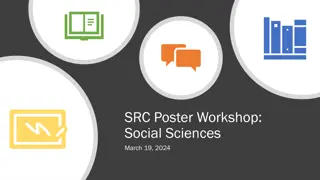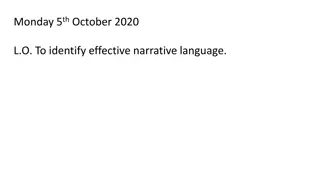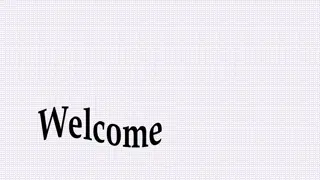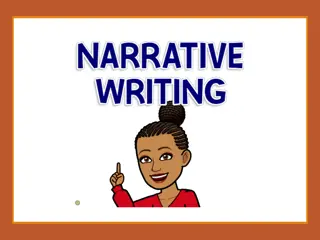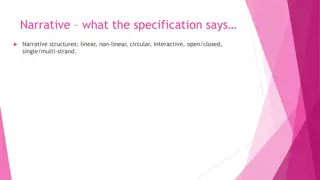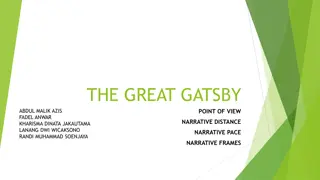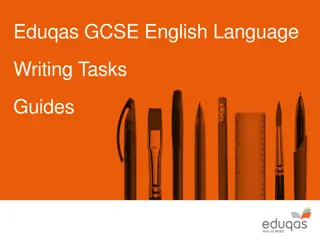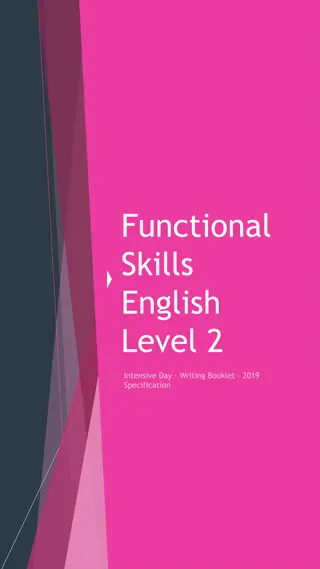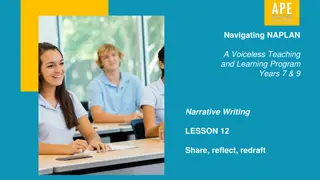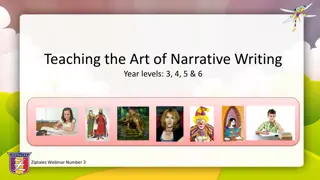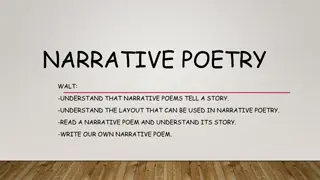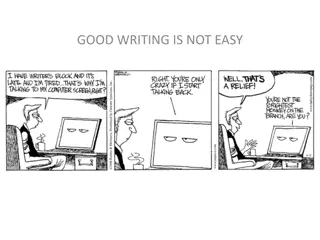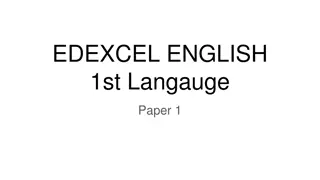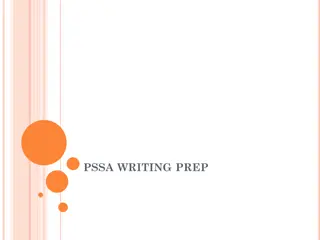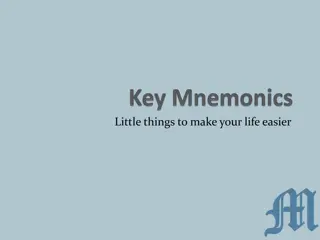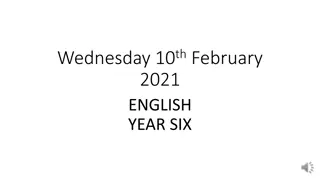Mastering Narrative Writing: Techniques and Tips
Dive into the world of narrative writing with this comprehensive guide! Learn the nuances of crafting fictional and personal stories, explore dialogue techniques, understand the structure of a narrative, and enhance your writing with impactful vocabulary. Whether you're a beginner or seeking to refine your skills, this resource has everything you need to excel in storytelling.
Download Presentation

Please find below an Image/Link to download the presentation.
The content on the website is provided AS IS for your information and personal use only. It may not be sold, licensed, or shared on other websites without obtaining consent from the author. Download presentation by click this link. If you encounter any issues during the download, it is possible that the publisher has removed the file from their server.
E N D
Presentation Transcript
NARRATIVE Personal and story writing
NARRATIVE https://www.youtube.com/watch?v=mj-eh5VFsg0
NARRATIVE WRITING A Narrative is a STORY. Narrative ~ A fictional story you can make up all of the events. Personal Narrative~ A TRUE story about an event that happened in your life.
ORDER Beginning: Introduce characters, place Middle: Events happen (Rising Action) Use details Keep the events progressing forward (No two pages on how the dude made a sandwich). End: Result (Falling Action)
NARRATIVE WRITING Tell a fictional story. Write the events in order. Remember your plot diagrams. You can do flashbacks. Paragraphs can be any size. INDENT! Still proper grammar, spelling and capitalization.
DIALOGUE Indent for each new speaker. Use quotation marks. Use commas inside the quotation marks, then who said the words.
Wow, Jim said as he walked down the eerie hallway to his destination. I can t believe it! Hey, wait up! Joe yelled, as he saw his friends shadow disappear around the corner. Blah, blah, blah, blah Blah, blah Blah, blah Blah, Blah,blah Blah, blah Blah, blah Blah, blah Blah, blah Blah. Relax bro, Jim retorted.
BACK AND FORTH CONVERSATION Look at that, Jim said. I know, whispered Joe. How do you know? I just do. Yeah, right. (You can stop using their names each time when they talk back and forth right away).
CONTINUED TALKING No Capital letter if you continue after you write: I said or Joe said Sir, I said to the officer, the kid just broke his arm.
NARRATIVE VOCABULARY Cause and effect: Do something, something happens Chronological order: Events go in order of TIME
NARRATIVE VOCABULARY Flashback: Go back in time to explain an event or feeling Foreshadowing: Hints to future events Adjectives: Describe nouns Sensory language: See, hear, feel, taste, smell
FIGURATIVE LANGUAGE Idiom: Piece of cake Personification: The wind was screaming Oxymoron: Jumbo shrimp
FIGURATIVE LANGUAGE Simile: She was like a tiger on the court. Metaphor: She was a tiger Hyperbole: I am so hungry I could eat a horse. I am so tired I could die. Alliteration: Billy Bob bought a bright blue BMW.
POINT OF VIEW First Person: Character is the narrator. Use I and we Second Person: When the narrator puts the reader in place of the main character. Uses you Third Person Limited: Only see the perspective of one character.
POINT OF VIEW Third Person Omniscient: The narrator knows the thoughts of all characters. You see the story from many perspectives.
CHARACTER TRAITS CLASS COPY Read through with partner Think of fav. Fictional character Fav book, movie, TV show Follow the flow chart and diagrams Copy and complete them in your NB: writing section
HOME RUN Read the poem Analyze how the moment gets slowed down Answer the questions in your NB: writing section
GROUP WORK You will be working in groups and analyzing 4 different personal narratives For each of the narratives you must use SOAPSTone We re Poor Salvation Frank Sinatra s Gum The Death of a Moth
PERSONAL NARRATIVE https://www.youtube.com/watch?v=iWHc5Yar6Ps What is an important lesson you learned?

























